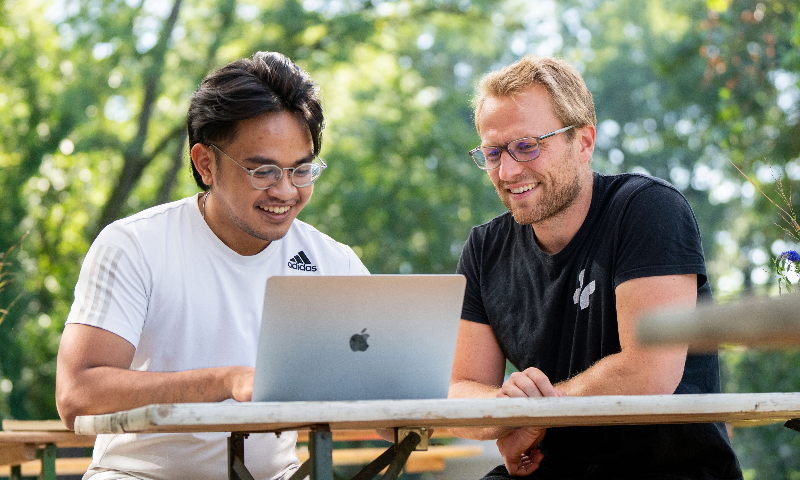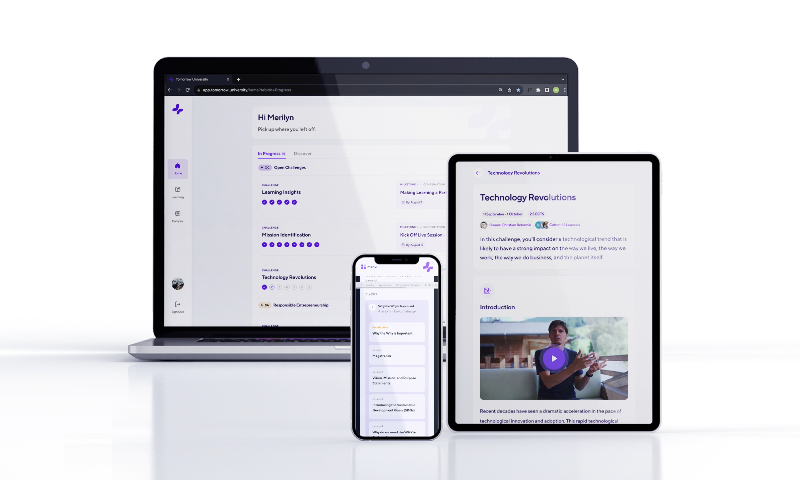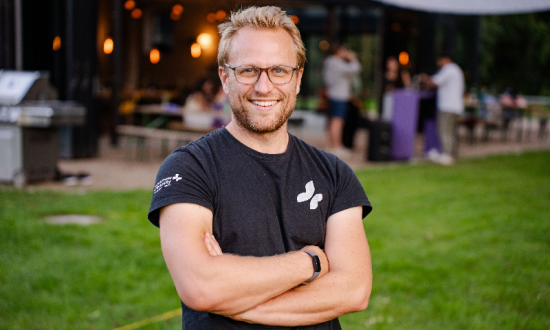Thomas Funke is a stalwart in the realms of education and entrepreneurship and the Co-Founder and Co-CEO of Tomorrow University of Applied Sciences. With an illustrious career spanning over 15 years in the education sector, Funke has passionately championed the intersection of education and entrepreneurship.
As a lecturer specializing in entrepreneurship and innovation at both Goethe University Frankfurt and the WU Executive Academy of the Vienna University of Economics and Business, Funke brings a wealth of academic insight to his roles. In 2016, he took his commitment a step further by founding TechQuartier, a vibrant ecosystem in Frankfurt encompassing a startup hub, coworking space, and community haven. Since its inception, Funke has played a pivotal role in guiding nascent startups on their journey to success.
Beyond academia and startup mentorship, Funke extends his influence to the digital realm as part of the advisory board for Eintracht Frankfurt soccer club and iamstudent.eu. His academic journey includes the completion of a Ph.D. in Entrepreneurship from the Vienna University of Economics and Business, following the study of International Business.
In an engaging conversation with Higher Education Digest, Thomas Funke delves into the significance of 21st-century skills, the cultivation of sustainability-related competencies, and the essential skills for individuals navigating the complexities of the digital age. Join us as we explore insightful excerpts from this enlightening dialogue.
How would you define the term “21st-century skills” in the context of education? Why do you believe these skills are crucial in today’s rapidly changing world?
21st-century skills are essential in the context of education, tailored for a rapidly evolving world marked by swift changes, emerging business models, and advancing technologies. These skills aim to equip individuals to navigate and thrive in dynamic environments. Our research project focused on meta-competencies and 21st-century skills, resulting in a model designed to empower learners not only to comprehend and analyze critically but also to proactively drive change. Our framework comprises four levels with a total of 100 competencies integrated into all our curricula. These competencies include critical thinking, technological literacy, self-empowerment, sustainability thinking, entrepreneurial spirit, and emotional and social intelligence, collectively fostering the capability to act, develop, design new business models, products, and lead change.
In your opinion, how does fostering sustainability-related skills contribute to the overall development of an individual?
Fostering sustainability-related skills significantly contributes to an individual’s overall development. Our competency in sustainable thinking involves understanding complex systems rather than just linear cause-and-effect relationships. In a world of interconnectedness, individuals must navigate and act within these systems. Sustainability encompasses ethical decision-making for the greater good, considering the community’s welfare alongside personal benefits. It goes beyond mere innovation for profit, emphasizing value delivery to society while ensuring no harm to the planet. The impact on individual development varies depending on the specific aspect of sustainability considered.

From an educational standpoint, what role can institutions play in instilling a sense of environmental responsibility in learners?
From an educational standpoint, institutions play a crucial role in cultivating environmental responsibility in learners. Focusing on the environmental dimension of sustainability, institutions can heighten awareness of the human impact on the environment, both negative and positive. Knowledge and understanding empower individuals to make informed judgments and navigate complex situations. Our approach involves imparting a comprehensive understanding of the various dimensions of value and innovation. We emphasize that true innovations contribute to society while remaining environmentally friendly, avoiding harm to the planet. Our educational efforts extend to encouraging learners to act responsibly, considering not only short-term but also long-term implications. Education institutions bear a significant responsibility to foster both literate and responsible individuals capable of proactive action.
How does cultivating entrepreneurial skills enhance a person’s adaptability and problem-solving abilities?
Cultivating entrepreneurial skills significantly enhances adaptability and problem-solving abilities. These skills involve ideation, effectuation, and leveraging available resources to maximize outcomes. Entrepreneurial thinking encourages viewing problems as opportunities, emphasizing divergent thinking to generate multiple solutions rather than converging on a single answer. This mindset aligns with the principles outlined by Clayton Christensen, emphasizing adaptability and resilience. In a rapidly evolving world, the ability to adapt to change and thrive in a dynamic environment becomes crucial. Entrepreneurial skills are inherently linked to problem-solving, reinforcing their role in fostering adaptability in individuals.
As technology continues to evolve, what skills do you think are indispensable for individuals to navigate and thrive in this digital age?
In the evolving landscape of technology, individuals must possess indispensable skills to navigate and thrive in the digital age. Crucially, being technologically literate involves understanding and effectively using new technologies. This literacy extends beyond the ability to code or delve deeply into tech development, which may be a specialized skill. Instead, it emphasizes the capacity to grasp new technological developments and discern their application fields. While some individuals may specialize in coding and machine building, the broader populace should focus on the practical and responsible use of technology. Mastery in using digital technologies becomes equally important as it enables individuals to comprehend the effects and impacts, such as those associated with artificial intelligence, without the necessity for everyone to be proficient in coding.

How can educational institutions effectively integrate technology into their curriculum to prepare students for the demands of the modern workforce?
Educational institutions can effectively integrate technology into their curriculum by emphasizing hands-on experience and practical application. This involves actively working with modern technologies through challenges and analyses. For instance, in courses like “Technology Revolutions,” students can assess new technologies for their potential and future applications. This approach directly embeds technology into the curriculum, allowing students to understand concepts, learn to code, and apply their knowledge to real-world challenges. By incorporating technology into various tasks and challenges, students not only become familiar with its use but also gain valuable insights into how it can enhance problem-solving and mission development. The key is to blend theoretical understanding with practical application, ensuring students are well-prepared for the demands of the modern workforce.
Do you see value in interdisciplinary learning as a means to develop a holistic set of skills? Why or why not?
Certainly, I strongly believe in the value of interdisciplinary learning as a means to develop a holistic set of skills. Our learning model is intentionally interdisciplinary, fostering collaboration among diverse disciplines. In our Bachelor’s program, for instance, we bring together coders, business professionals, marketers, entrepreneurs, strategy experts, and product designers during the calibration and second phases. This approach allows individuals with different skill sets to learn from one another.
Interdisciplinary learning extends beyond the subjects chosen and includes diverse backgrounds and perspectives. I find that diversity, not just in academic disciplines but also in cultural backgrounds, is equally crucial. The exchange of ideas and learning from different cultures contributes to breaking down perceived borders, promoting a more inclusive and globally aware perspective. Therefore, I see interdisciplinary learning as a pathway to holistic skill development, with an added emphasis on the importance of diversity in the learning process.
What challenges do you foresee in implementing a curriculum that focuses on these 21st-century skills?
The primary challenge lies in ensuring that accrediting bodies and regulators can adapt to the rapid changes, particularly in emerging technologies like artificial intelligence (AI). The recent advancements in AI have implications for knowledge testing methods, prompting questions on how universities can effectively integrate such technology into their curriculum. This involves utilizing AI tools, such as chatbots and tutors, to provide feedback on knowledge. The challenge extends to universities keeping pace with these changes while also urging regulators to update regulations that may not align with the demands of the 21st century. Striking a balance between staying current and adhering to existing regulations poses a significant challenge for educational institutions.
Are there innovative solutions or approaches you’ve come across that address these challenges effectively?
Effectively multiple, one of them being us. So I think we’re trying to use technology not just to embed it into the curriculum, but, at the same time, also for our learning model. I’ve seen many other universities or educational institutions use modern technology also for educational purposes. So as I said, chatbots Tech, A I to enhance the learning experience. But then some globally great schools and universities focus on the most modern technologie and also on interdisciplinary learning. So I see a lot of different solutions there.

How can individuals with a strong foundation in sustainability, entrepreneurship, and technology positively impact their communities?
For us individuals possessing a strong foundation in combination of these three pillars in sustainability, entrepreneurship, and technology can profoundly impact their communities through a holistic approach:
Deep Understanding of Sustainability: These individuals comprehend sustainability at its core, going beyond traditional roles such as CSR managers. Their understanding extends to practical applications and problem-solving within the sustainability domain.
Entrepreneurial Action and Problem-Solving: The fusion of sustainability and entrepreneurship involves more than report writing or carbon footprint measurement. It emphasizes taking entrepreneurial action to address challenges and solve problems. This proactive approach ensures a direct and tangible impact on the community.
Utilizing Technology for Positive Change: Individuals with this skill set recognize technology as a powerful tool for positive change. They leverage their technological knowledge to implement solutions that contribute to a better world. This includes creating and utilizing circular business models that align with sustainable practices.
Systematic Combination of Pillars: Rather than treating sustainability, entrepreneurship, and technology as separate pillars, these individuals adopt a systematic approach. They integrate these disciplines to form a comprehensive framework for creating positive change. This approach ensures a more synergistic and effective impact on their communities.
In essence, individuals with a strong foundation in sustainability, entrepreneurship, and technology possess the capacity not only to understand these concepts but also to act proactively, solve problems, and leverage technology for meaningful and positive change in their communities.
From a broader perspective, what societal changes can we expect with a workforce equipped with these skills?
From a broader perspective, a workforce equipped with these skills is anticipated to catalyze transformative societal changes. The focus on climate action is expected to drive the development of innovative technologies, aligning with the comprehensive framework of the Sustainable Development Goals (SDGs). Learners, armed with these skills, are likely to actively engage in solutions that span all 17 SDGs, demonstrating a collective commitment to global sustainability.
Moreover, there is a distinct emphasis on fostering diversity, equity, and inclusion within the workforce. Learners are not merely advocates but active participants in reshaping organizations into more responsible entities. This commitment extends beyond individual initiatives, reflecting a broader societal shift toward building inclusive and equitable workplaces.
In essence, the anticipated impact of a skilled workforce transcends individual endeavors, showcasing a diverse community that actively addresses a wide array of societal challenges. The multifaceted approach includes climate action, technological innovation, and a commitment to diversity, equity, and inclusion, contributing to a more sustainable, equitable, and inclusive society.
What trends do you anticipate in the evolution of education to further enhance these critical skills?
Individualized education: I think that is a huge trend currently. Instead of curriculum off the shelf, a specific person gets a different curriculum because they have a different set of competencies, and a different set of interests. For an example: I’m passionate about different things, but I’m not as good at coding Christian, my co-founder Christian, is. So in an ideal world, since I am at a different competency level, I would get a different challenge based on my actual interest and skill level. So it’s a trend with huge potential! Moving towards individualized education is should really be the goal of any educational institute.
Competency based: The second thing that I do see is competency-based learning. So not only focusing on writing down one’s learning outcomes, but then actually measuring for concrete competency growth and also seeing your competency development over time. So not just getting marks or grades but actually seeing how you further your competencies.
University positions in society: Those are the two main trends that I see apart from many others. But then also that universities rethink their role, and that they actually become a content repository with great new theories or technologies being developed. And that this knowledge is also easily and publicly accessible when needed. So that’s a broader trend that I do see universities will definitely shift towards and change in their position in society.
These trends signify a transformative phase in education, focusing on personalized learning experiences, measurable competency growth, and a redefined societal role for educational institutions.
Are there emerging fields or industries that you believe will require a specific emphasis on these 21st-century skills?
Every industry is currently impacted, requiring a workforce equipped with 21st-century skills. The distinction between knowledge workers and blue-collar workers is becoming less relevant, especially with the advent of AI, which now rivals human cognition. Industries heavily dependent on human dimensions such as emotions may experience a slower disruption. However, the transformation is not confined to physical labor but extends to the cognitive aspects, affecting knowledge worker industries like consulting, law, and banking. Profound changes are expected across various sectors, necessitating individuals with adaptability and 21st-century skills. Additionally, industries where emotions play a vital role, such as psychology or coaching, will also demand individuals capable of adapting to emerging roles.




